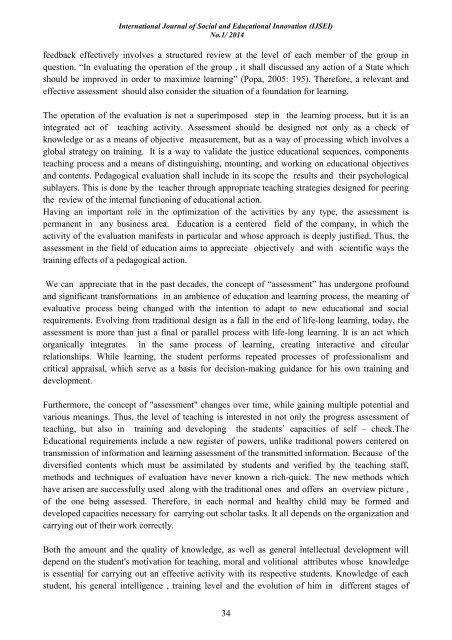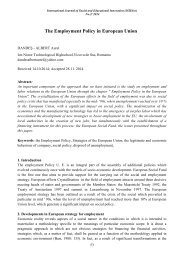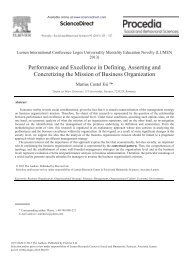International Journal of Social and Educational Innovation (IJSEI)
International Journal of Social and Educational Innovation (IJSEI) publishes research paper in the field of: Social Science and Humanities, Education, Psychology, Philosophy, Logics, Ontology and Philosophy of Science, Political Science, History, Sociology, Business and Marketing, Economics, Financial Development, Accounting, Banking, Management, Human Resources, Law, Public Administration Environmental Studies, Climate Change, Educational Technology, Language and Linguistics and so on. All papers which will be sent for evaluation/ publishing must contain educational approaches.
International Journal of Social and Educational Innovation (IJSEI) publishes research paper in the field of: Social Science and Humanities, Education, Psychology, Philosophy, Logics, Ontology and Philosophy of Science, Political Science, History, Sociology, Business and Marketing, Economics, Financial Development, Accounting, Banking, Management, Human Resources, Law, Public Administration Environmental Studies, Climate Change, Educational Technology, Language and Linguistics and so on.
All papers which will be sent for evaluation/ publishing must contain educational approaches.
You also want an ePaper? Increase the reach of your titles
YUMPU automatically turns print PDFs into web optimized ePapers that Google loves.
<strong>International</strong> <strong>Journal</strong> <strong>of</strong> <strong>Social</strong> <strong>and</strong> <strong>Educational</strong> <strong>Innovation</strong> (<strong>IJSEI</strong>)<br />
No.1/ 2014<br />
feedback effectively involves a structured review at the level <strong>of</strong> each member <strong>of</strong> the group in<br />
question. ―In evaluating the operation <strong>of</strong> the group , it shall discussed any action <strong>of</strong> a State which<br />
should be improved in order to maximize learning‖ (Popa, 2005: 195). Therefore, a relevant <strong>and</strong><br />
effective assessment should also consider the situation <strong>of</strong> a foundation for learning.<br />
The operation <strong>of</strong> the evaluation is not a superimposed step in the learning process, but it is an<br />
integrated act <strong>of</strong> teaching activity. Assessment should be designed not only as a check <strong>of</strong><br />
knowledge or as a means <strong>of</strong> objective measurement, but as a way <strong>of</strong> processing which involves a<br />
global strategy on training. It is a way to validate the justice educational sequences, components<br />
teaching process <strong>and</strong> a means <strong>of</strong> distinguishing, mounting, <strong>and</strong> working on educational objectives<br />
<strong>and</strong> contents. Pedagogical evaluation shall include in its scope the results <strong>and</strong> their psychological<br />
sublayers. This is done by the teacher through appropriate teaching strategies designed for peering<br />
the review <strong>of</strong> the internal functioning <strong>of</strong> educational action.<br />
Having an important role in the optimization <strong>of</strong> the activities by any type, the assessment is<br />
permanent in any business area. Education is a centered field <strong>of</strong> the company, in which the<br />
activity <strong>of</strong> the evaluation manifests in particular <strong>and</strong> whose approach is deeply justified. Thus, the<br />
assessment in the field <strong>of</strong> education aims to appreciate objectively <strong>and</strong> with scientific ways the<br />
training effects <strong>of</strong> a pedagogical action.<br />
We can appreciate that in the past decades, the concept <strong>of</strong> ―assessment‖ has undergone pr<strong>of</strong>ound<br />
<strong>and</strong> significant transformations in an ambience <strong>of</strong> education <strong>and</strong> learning process, the meaning <strong>of</strong><br />
evaluative process being changed with the intention to adapt to new educational <strong>and</strong> social<br />
requirements. Evolving from traditional design as a fall in the end <strong>of</strong> life-long learning, today, the<br />
assessment is more than just a final or parallel process with life-long learning. It is an act which<br />
organically integrates in the same process <strong>of</strong> learning, creating interactive <strong>and</strong> circular<br />
relationships. While learning, the student performs repeated processes <strong>of</strong> pr<strong>of</strong>essionalism <strong>and</strong><br />
critical appraisal, which serve as a basis for decision-making guidance for his own training <strong>and</strong><br />
development.<br />
Furthermore, the concept <strong>of</strong> "assessment" changes over time, while gaining multiple potential <strong>and</strong><br />
various meanings. Thus, the level <strong>of</strong> teaching is interested in not only the progress assessment <strong>of</strong><br />
teaching, but also in training <strong>and</strong> developing the students` capacities <strong>of</strong> self – check.The<br />
<strong>Educational</strong> requirements include a new register <strong>of</strong> powers, unlike traditional powers centered on<br />
transmission <strong>of</strong> information <strong>and</strong> learning assessment <strong>of</strong> the transmitted information. Because <strong>of</strong> the<br />
diversified contents which must be assimilated by students <strong>and</strong> verified by the teaching staff,<br />
methods <strong>and</strong> techniques <strong>of</strong> evaluation have never known a rich-quick. The new methods which<br />
have arisen are successfully used along with the traditional ones <strong>and</strong> <strong>of</strong>fers an overview picture ,<br />
<strong>of</strong> the one being assessed. Therefore, in each normal <strong>and</strong> healthy child may be formed <strong>and</strong><br />
developed capacities necessary for carrying out scholar tasks. It all depends on the organization <strong>and</strong><br />
carrying out <strong>of</strong> their work correctly.<br />
Both the amount <strong>and</strong> the quality <strong>of</strong> knowledge, as well as general intellectual development will<br />
depend on the student's motivation for teaching, moral <strong>and</strong> volitional attributes whose knowledge<br />
is essential for carrying out an effective activity with its respective students. Knowledge <strong>of</strong> each<br />
student, his general intelligence , training level <strong>and</strong> the evolution <strong>of</strong> him in different stages <strong>of</strong><br />
34





